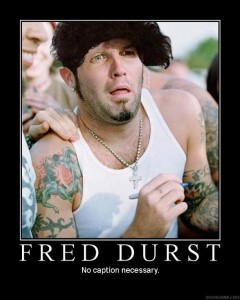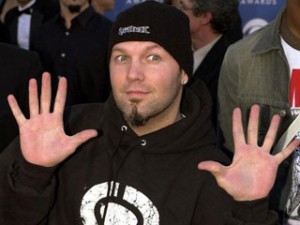Nu-metal was the ugly blemish on the face of the music industry in the late 90’s. America and people around the world were fascinated with bands like Korn and Limp Bizkit. They were brash and uninhibited. They were also simple. Simple in not only their lyrical style (I’m talking to you Fred Durst, Surprise! Fuck does not actually rhyme with fuck) but musically as well. It wasn’t your dad’s metal anymore. It had taken the aggression of the metal bands of yesteryear and exchanged guitar virtuosity and minute-long solos for DJ’s and drop-D tuning.
Looking back on it all, most of it was terrible. But I was an angry 12-year-old boy with the raging hormones of puberty calling the shots. Puberty unfortunately chose for me to be encapsulated with bands like Limp Bizkit (at least it was better than my Sugar Ray phase, or was it?) because during my adolescence, they were like me. They were as angry as I was, cursing in every line, and didn’t fit the mainstream sensibility (a.k.a The Backsteet Boys and N’Sync). They also got lots of women, which at that point in my life, was my top priority.
Yet, going through my CD collection I recently revisited a band that had a strong hand in kick starting it all. That band was the Deftones. With their first two albums, they constructed the archetypal formula for what nu-metal was. Then, in 2000, they broke away from the sound they helped develop with their third effort, “White Pony,” exploring a whole new side of themselves and indefinitely setting them apart from a genre that was beginning to unravel.
Cover: With re-releases and limited edition copies, this album has had four covers over the years but just like anything that has been re-released, it’s pretty much the same fucking thing, so I’m just going to go with the original cover (deal with it.) The dark grey background blends well with the majestic looking silhouette of a white pony strategically placed in right-hand corner. A surprisingly simple cover for a complex album.
The real question though is what was the catalyst for the album title? White pony has two reference points that I know of (or at least that Google knows of). The first reference could be to the slang term for cocaine, but lets be honest, these guys don’t seem to be fans of white girl. Maybe white girls, but not the white girl. The second reference could be from the idea that if you are having a dream about a white pony, it’s considered a sexual dream. I don’t know what kind of fucked up Freudian dreams the dudes in Deftones are having, but I can pretty well assure you that when I’m having a sexual dream, it doesn’t involve any farm animals, or any animal for that but that’s neither here nor there.
In summation, it doesn’t matter what the name is (in The Rock’s voice) or means. The music speaks for itself.
Sound: Okay, so this one is a little tricky. Almost every track on the album sounds completely different but still seems to keep within the same Deftones tone (Ha! See what I did there?). Schizophrenic seems the only fitting term to describe it.
Singles like “Change (In the House of Flies)” and “Digital Bath” both have soundscapes that give the songs an atmosphere that was previously unfound in their music. Tracks like “Korea,” “Elite,” and “Street Carp” instill the edge and heaviness they had on their past two records, while Chino Moreno’s scream almost brings about a hardcore feel. Then you have a song like “Teenager” which is something all its own. Almost reminiscent of the dream-pop sound that the Smashing Pumpkins perfected, but with the addition of the nice scratching line by Frank Delgado, it preserves that Deftones sound.
With appearances by Maynard James Keenan (Tool, A Perfect Cirlce) on the song “Passenger” and Scott Weiland (Stone Temple Pilots) on “RX Queen” the Deftones really challenged themselves musically and expanded their talents far outside the nu-metal category they were placed in.
Lyrics: Moreno’s writing process on this album was a totally new approach than he had ever taken previously. In an interview with Alternative Press he stated, “I basically didn’t sing about myself on this record. I made up a lot of story lines and some dialogue, even. I took myself completely out of it and wrote about other things. Once I did that I was able to sing about anything I wanted to, I could be a lot more general. There’s a lot of stuff on this record that people are going to question me about, and I can just remove myself from it. It’s not me. I’m writing a story here.”
I’m not one for quotes, especially from an interview I didn’t conduct, but who can really say it better than the man himself. Every song tells a different story. Some are more abrasive than others. For instance, on “Digital Bath,” the song takes you through the eyes of a man murdering a girl in a bathtub. A heavy subject for a song with such a laid back texture but at least we know that the song’s not based in reality.
Then take a song like “Teenager,” which was written by Moreno at the age of 15. It describes a young man’s relationship (most likely his first) coming to its bitter end. It’s sad, but simple and surreal at the same time. Just like any 15-year-old’s relationship should be.
Moral of the story: the Deftones not only took themselves to new heights musically with “White Pony” but Moreno expanded himself as a writer as well, breathing new life into his art and giving us a reprieve from the constantly censored radio rock that was being spewed out by sophomoric groups like Limp Bizkit.
Impact: The album was well received by most critics because it was taking chances that other bands at the time wouldn’t . Later that year, they were rewarded for their creativity by receiving a Grammy for “Best Metal Performance” for their song, “Elite” (one of the only things the Grammy’s has done right) and have been cited as an influence from bands ranging from Muse to Avenged Sevenfold and even System of a Down.
With their first two releases, the Deftones helped spark a sound that would become the next big rock sensation just a few years later (Thanks a lot, guys). Yet, with “White Pony” the group chose to distance and distinguish themselves from the nu-metal genre they helped incite, making a sound all their own and this week’s Classic Cut.




